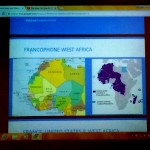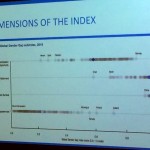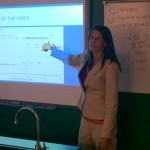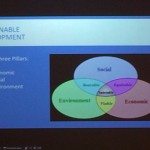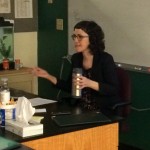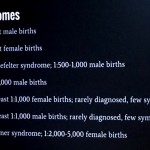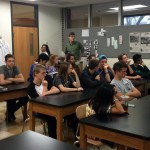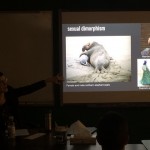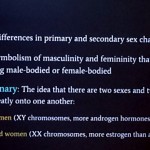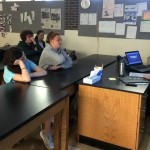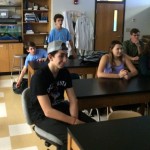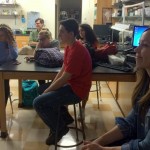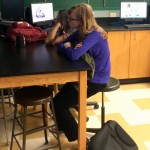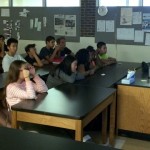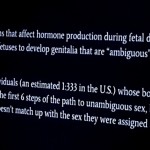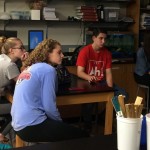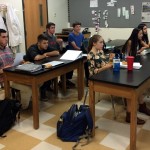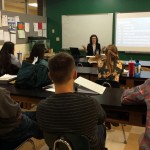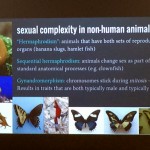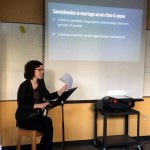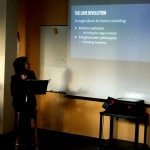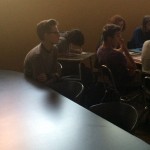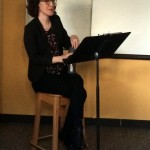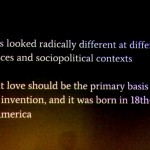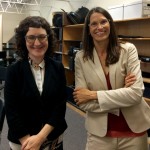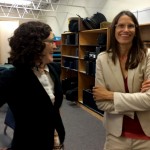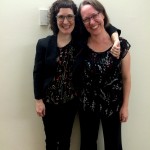During the week of October 17-21, we were honored to have two visiting experts on campus to discuss the broad topic of gender. This coincided well with the Oct. 19 Commons Speaker Series presentation featuring a panel on transgender identities, but allowed the faculty to engage Milena Novy-Marx and Pamela Butler with their classes during the day in ways that deepened the students’ understanding of their curricular content.
Milena Novy-Marx, Harley parent and board member, teaches a course this semester at the University of Rochester in International Relations entitled “Women, Men, Gender, and Development.” She spent a few days connecting with students in French 8, Environmental Science, Rights & Responsibilities, and Sustainable Systems. The main content of her presentations revolved around the most recent Global Gender Gap Report (which has since been formally published on 10/26/16), focusing on gender equity in terms of health, education, economics, and politics. With the French 8 class, she shared results with the students about Francophile nations around the world and how they measure up, then asking them to consider how the United States compared to some of the top-ranking countries (Iceland is #1, US is #45). While overall, the world is improving in terms of access to health care and education, the other two measures lag far behind.
Dr. Novy-Marx dove a little deeper into the study results and their link to sustainability with the students in Environmental Science, Sustainable Systems, and Rights & Responsibilities. The Sustainable Development Goals were recently and unanimously approved by a vote in the United Nations, shifting the focus to the environment much more than in the previous Millennium Development Goals (from 2000). Education was identified as the #1 way to reduce poverty, which is the best investment in remedying the world’s ills broadly. It was also shared that for every year of education a girl gets, her annual income increases.
Our second guest was Dr. Pamela Butler, Visiting Associate Director and Director of Undergraduate Studies in the Gender Studies Program at Notre Dame. She also happens to be Kristy Houston’s sister (our MS/US band teacher). While a self-proclaimed historian, she offered valuable and scientific insights into human biology beyond the sexual binary and presented to all Biology, Honors Biology, and AP Biology classes on that topic. Starting off with the interesting life of an angler fish, she discussed sexual dimorphism in the animal world (elephant seals, peacocks, etc.), then shared that we, as humans, are remarkably close as males and females. The world has forever been interested in the differences between the sexes, and Dr. Butler explored that there are only a very few differences between men and women that are immutable. Mental rotation is one of those differences, but even with that, studies show that women are able to perform at the same level as men with only two minutes of additional practice (Tetris-like training). Dr. Butler referenced the many ways we as a society work hard to make it appear that we are more sexually dimorphic than we are (clothing, make-up, hair length, social behavior). Other interesting discussions revolved around chromosomal differences in humans, and that 1 in 100 people doesn’t fit the “male/female” classification. She then dove into the interesting biology of animals which can switch gender or have both sex organs present to meet the needs of societal balance or perpetuating their species (banana slugs, clownfish, hamlet fish, frogs, etc.).
- Dr. Pamela Butler and Dr. Milena Novy-Marx
- Meeting in the band room
- No family resemblance whatsoever…. Pamela with her sister, Kristy.






